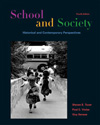As the MTV article by Steve Johnson in the text shows, children and youth today are being bombarded by sexual and violent images as never before. It is likely that you as an adult enjoy some movies, television shows or music that you might be very concerned about children and teenagers having access to. You might see young children in the audience at movies you feel are inappropriate for them, and hear kids talking about well- known singers whose messages are violent and sexist. This exercise is not about censorship, and certainly you as a teacher have limited control over what your students see and hear outside the classroom. However, it's a good idea for you to be familiar with the kinds of messages kids are getting today, because chances are you will be become aware of these messages, and how your students are perceiving them, through student work, discussions and behaviors. You may find yourself with the opportunity to confront racist, sexist, and other unacceptable perspectives in your classroom–will you? There are a number of sites on the Internet that provide detailed information about the content of films, both current and past, as well as sites that provide lyrics to virtually everything on popular CDs today. You can start with the American Academy of Pediatrics policy statement on popular culture and its impact on youth, also provided below. |



 2002 McGraw-Hill Higher Education
2002 McGraw-Hill Higher Education